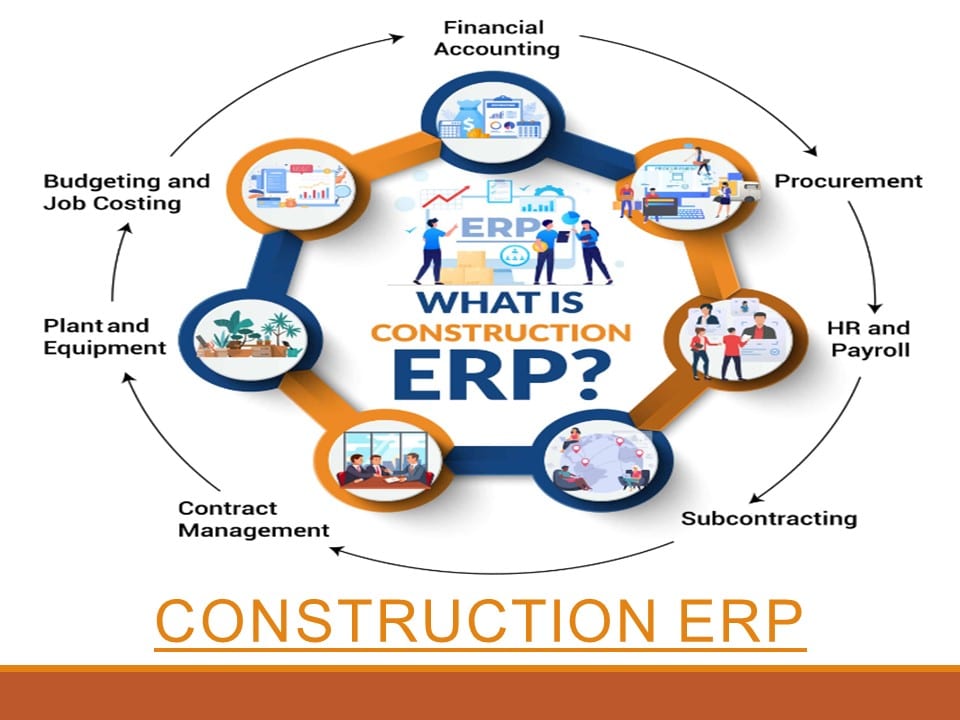Construction ERP (Enterprise Resource Planning) refers to specialized software systems designed specifically for the construction industry to manage and streamline various aspects of construction project management. These ERP solutions are tailored to meet the unique needs and challenges faced by construction companies, contractors, and builders.

Construction ERP systems integrate and centralize multiple functions and processes involved in construction project lifecycles, such as project planning, resource allocation, budgeting, procurement, scheduling, inventory management, document control, and more. By consolidating these diverse functions into a unified platform, Construction ERP aims to enhance efficiency, collaboration, and decision-making across different project phases.
Key features and functionalities of Construction ERP include:
- Project Management: Tracking project progress, milestones, schedules, and resource allocation in real-time.
- Resource Allocation: Optimizing labor, equipment, and material allocation for efficient project execution.
- Financial Management: Managing budgets, expenses, invoicing, and payments related to construction projects.
- Procurement and Inventory Control: Streamlining procurement processes, managing supplier relationships, and monitoring inventory levels.
- Document Management: Organizing and storing project-related documents, contracts, blueprints, and compliance records.
- Subcontractor Management: Handling subcontractor agreements, payments, and performance evaluations.
- Risk Management: Identifying, assessing, and mitigating risks associated with construction projects.
- Reporting and Analytics: Generating reports, providing data-driven insights, and facilitating informed decision-making.
Construction ERP systems can be deployed on-premises or through cloud-based solutions, offering scalability and accessibility across multiple devices and locations. These systems aim to improve project visibility, streamline operations, reduce costs, minimize delays, and enhance overall project outcomes.
Popular Construction ERP software includes platforms like Procore, Viewpoint, Oracle Primavera, CMiC, Sage 300 Construction and Real Estate, among others. These solutions are continuously evolving to meet the evolving needs of the construction industry, providing comprehensive tools and functionalities to address the complexities inherent in construction project management.
Improving Construction Efficiency with ERP: Digital Transformation in the Construction Industry
The construction industry is one of the few industries that has unique challenges in project management, resource allocation, and effective management. To respond to this complexity, Enterprise Resource Planning (ERP) solutions tailored to the needs of the construction industry have become an important milestone in driving efficiency, transparency and integrated management.
ERP Construction: The Foundation of Transformation
- Integrated Project Management
- ERP for construction provides a platform that combines project planning, scheduling, estimating, and risk management to improve visibility and coordination.
- Efficient Resource Management
- This system allows better allocation of labor, equipment, and materials, minimizing bottlenecks and delays.
- Accurate Financial Management
- From monitoring costs to managing bills and payments, ERP helps control budgets and ensures greater financial transparency.
- Integrated Supply Chain Management
- ERP helps in managing procurement processes, relationships with suppliers, and optimizing inventory stock.
Key Features of Construction ERP
- Centralized Project Management
- Project monitoring, document management, team collaboration and real-time updates.
- Resource Planning
- Integrated labor allocation, equipment management and material planning.
- Financial Management
- Budget management, project accounting, cost monitoring, and billing processes.
- Procurement and Inventory Management
- Automate purchasing processes, vendor management, inventory control and real-time stock updates.
The Ultimate ERP Platform for Construction
- Procore
- Focus on project management, documentation, collaboration, and construction management.
- Viewpoint
- Provides integrated solutions for project management, finance and human resources.
- Oracle Primavera
- Specialist in project planning and portfolio management with powerful analytical tools.
- CMiC
- End-to-end solutions for project management, finance and risk management.
- Sage 300 Construction and Real Estate
- Focus on financial management, project accounting, and construction operations.
Benefits of Digital Transformation in Construction
- Operational Efficiency: Better scheduling, efficient management of resources, and accurate monitoring of the overall project.
- Better Quality: The use of real-time data helps identify and resolve problems faster, ensuring higher quality results.
- Enhanced Collaboration: Enables better collaboration between project teams, stakeholders and partners.
- Better Decisions: Deep data analysis provides the insights needed for timely decision making.
Custom ERP for the construction industry is not just about managing projects better but also driving transformation towards greater efficiency, better cost control and more successful project delivery overall. In an era where digital transformation is increasingly becoming a necessity, implementing ERP in the construction industry is the key to maintaining competitiveness and providing significant added value.